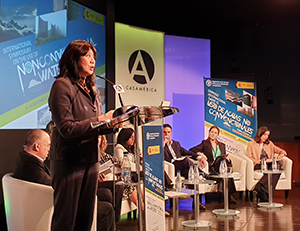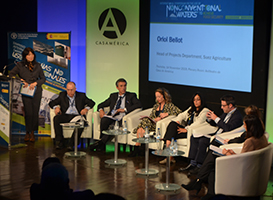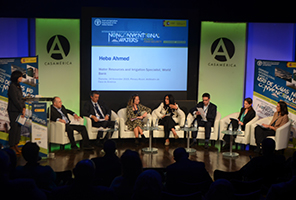Technical Session 1: Achieving the SDGs – How to make it happen?
Keynote Speaker - Kala Vairavamoorthy, Executive Director, International Water Association (IWA)
November 14th, 11:00 – 12:30
Session Chair: Ms Sasha Koo-Oshima, Deputy-Director, Land & Water Division, FAO
Panelists:
- Mr Shony Goldberger, Head of the Jerusalem District, Ministry of Environment, Israel
- Mr Claudio Bacigalupi, Head of Water Sector, International Cooperation and Development Unit – Environment, Natural Resources, Water, European Commission (EC)
- Ms Teresa Navarro, Director of Water and Sustainability, University of Murcia, Spain
- Ms Heba Ahmed, Water Resources and Irrigation Specialist, World Bank
- Mr Oriol Bellot, Head of Projects Department, Suez Agriculture
- Ms Valeria Silvestri, Water Management and Rural Infrastructure Expert, International Fund for Agriculture Development, IFAD
- Ms Maria Lahore, Principal Executive, Development Bank of Latin America (CAF)
Session Summary

The introductory panel session provided the context on the use of non-conventional waters towards achieving the SDGs. Non-Conventional Water use alleviates the growing water security challenges, such as population growth, water pollution, and climate change. The opening session of diverse practitioners from policy, technology, and finance institutions set the three themes of the Symposium. Key messages of the session included:
- Removal of barriers and creation of an enabling environment by setting appropriate legislations and regulations, which enables financing mechanisms to be deployed to upscale innovative technologies on the use of non-conventional waters.
- Awareness raising in countries and with end-users on the use of non-conventional waters is a high priority. There is need to shift paradigms that lead to a circular economy.
Technologies on the use of non-conventional waters are already present and developing at a fast pace. International cooperation and public-private partnerships need to be boosted to allow implementation of such technologies and knowledge exchange.
Key take home points from each speaker:
The session speakers addressed two questions from the Chair:
- How does your organization or country work in making Non-Conventional Water use in agriculture happen to achieving SDGs?
- What are the promising opportunities in optimizing Non-Conventional Water use in agriculture and to achieve worldwide scale? How to remove the barriers in accelerating adoption?

Mr Shony Goldberger highlighted the challenges that population growth will pose on water demand. He presented the efforts of the Government of Israel in implementing Integrated Water Resources Management (IWRM), including the use of non-conventional water sources. In Israel, 86 percent of water is reused in agriculture. He highlighted the importance of setting appropriate legislations and regulations, in order to create an enabling environment for water infrastructure investment to happen. “It is important that the end-user understands and pays the cost of water, so that investments on water projects can be sustained,” Mr Goldberger said. He further emphasized the importance of technological advancement on non-conventional waters to make the implementation of IWRM more effective and efficient in all countries.
Mr Claudio Bacigalupi from the European Union highlighted the central role of water in national economies. The Water Sector of the European Commission’s International Cooperation and Development mainstreams water issues globally. Mr Bacigalupi highlighted that water bodies are often shared, therefore transboundary cooperation from both technical and political sides are crucial. The European Union is supporting countries to develop political agreements, which can then be further developed to a technical agreement. The EC also supports countries and projects on the financing aspect of non-conventional waters, such as on the use of blended finance to maximize resources . He also highlighted how urbanization affects water demand and management, and discussed the importance to design and implement a thorough water plan taking into account future trends of urban migration.
Ms Teresa Navarro presented the experience of the region of Murcia, Spain, which has high agricultural productivity with 2.5 million tons of vegetables and fruits produced per year. She stressed the importance of cooperation between academia and the public and private sectors. Ms Navarro mentioned that academia should be integrated and consulted in the decision-making processes in the water and agriculture sectors. In this way, research on this topic conducted by academia should address societal challenges and support policy and decision-making.

Ms Heba Ahmed provided concrete examples on how the World Bank supports countries including Egypt, Jordan and Morocco in bringing new investments to improve water management. This is achieved by providing both financial support (e.g. through loans) and technical support (e.g. irrigation modernization). In Egypt, support was provided to promote blended finance and also to increase the credit worthiness of the private sector. She highlighted the importance of engaging and communicating with governments in order to share knowledge within and across countries to improve water governance.
Mr Oriol Bellot presented the work of Suez, which operates in 80 countries globally. Suez supports countries in finding solutions on water resources management, including reclaimed water. Non-conventional waters can support the achievement of SDG2, 6 and 13 (e.g. reducing greenhouse gas emission in the wastewater plants), said Mr Bellot. In Spain, 150.000 tons of bio fertilizer are recovered and used in agriculture. Although many non-conventional waters solutions exist, efforts to scale up technologies need to be done. Water is a complex system and the solution needs to come from digitalization. Further work on technological upscaling is crucial, including on irrigation modernization. Shifting the paradigms of the relationship between the water footprints in food production is also important to improve water management globally.
Ms Valeria Silvestri presented IFAD’s experience and work with governments. . Ms Silvestri mentioned that the work of IFAD focuses on SDGs1 and 2 and addresses the needs of the most vulnerable rural populations. Water is one of the key working areas of IFAD, with more than 10 percent of recent investments going to water projects. IFAD is a partner of the Global Framework on Water Scarcity in Agriculture (WASAG). Itis cooperating with other institutions to unlock innovative financing mechanisms for water-related projects. In order to enable countries and people to adopt non-conventional waters, government financing and development assistance is not enough. The engagement with the private sector is paramount, and IFAD has recently modified its funding modalities to include opportunities for private sector and support for public-private-producer partnerships.
Ms Maria Lahore presented the work of the Development Bank of Latin America (CAF), which is investing in water projects in Latin America and the Caribbean (LAC). In order to achieve SDG6 in LAC, CAF is investing on improving access to water. One of the challenges of non-conventional waters is the lack of national legislation and awareness in countries. Climate change and population growth will further aggravate water scarcity issues. Ms Lahore highlighted that further integration is needed in water resources management towards a new circular economy-based system.” When providing water solutions, it is crucial to take into account the local context, as there is no one-solution-fits-all. It is important to have strategic investment plans that can be deployed in the long term.

